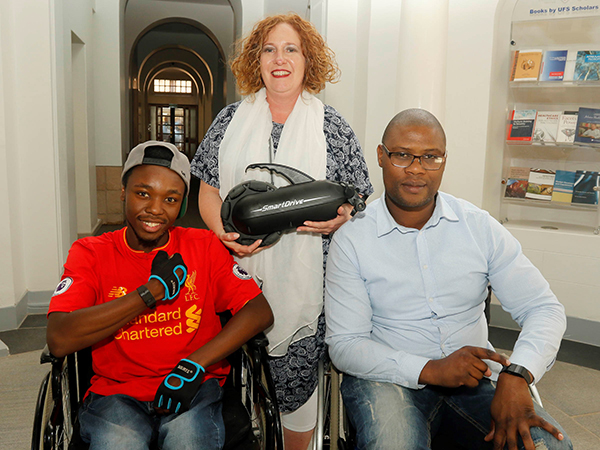Latest News Archive
Please select Category, Year, and then Month to display items
18 October 2021
|
Story Dr Nitha Ramnath

Our podcast guest
Prof Jeandrew Brink holds the post of Associate Professor in the Department of Mathematics and Applied
Mathematics within the Faculty of Natural and Agricultural Sciences at the University of the Free State. Her areas of interest include an analytical interest in Einstein field equations, dynamical systems, algorithms for testing general relativity
and the no-hair theorems, black holes, and gravitational waves. Prof Brink registered for a Bachelor of Sciences in 1998, continued with honours studies in 1999, and completed her master’s degree in 2000. Prof Brink’s research is on various
theoretical aspects of testing general relativity. She is a member of the MeerKAT telescope team that times and detect pulsars. She is also working with members of the Laser Interferometer Gravitational-Wave Observatory (LIGO) to find ways of using
gravitational waves to test Einstein’s theory.
Prof Brink was involved in the compilation of a video of geodesic orbits around a Manko-Novikov singularity, selected to be part of a Starmus 3 concert, the proceeds of which went towards promoting the Stephen Hawking Medal for Science Communication and
to support the charitable activities of the Stephen Hawking Foundation. It could also be part of a subsequent documentary.
Listen to the podcast at
François van Schalkwyk and Keenan Carelse,
UFS alumni leading the university’s United
Kingdom Alumni Chapter, have put their voices together to produce and direct the podcast series. Intended to reconnect alumni with the university and their university experience, the podcasts will be featured on the first Monday of every month,
ending in November 2021. Our featured alumni share and reflect on their experiences at the UFS, how it has shaped their lives, and relate why their ongoing association with the UFS is still relevant and important. The podcasts are authentic
conversations – they provide an opportunity for the university to understand and learn about the experiences of its alumni and to celebrate the diversity and touchpoints that unite them.
For further information regarding the podcast series, or to propose other alumni guests, please email us at
alumnipodcast@ufs.ac.za
For all Voices from the Free State podcasts,
click here.
SmartDrive devices give UFS wheelchair users more independence
2017-12-01

From the left, are: David Mashape; Martie Miranda, Head of the
Center for Universal Access and Disability Support at the UFS;
and Lawrence Qamba, celebrating the recent acquisition
of two SmartDrive Power Assist devices.
Photo: Johan Roux
Students who make use of wheelchairs at the University of the Free State (UFS) will now be able to move around campus more independently than before. This is thanks to two SmartDrive Power Assist devices acquired by the university.
Accessibility is very important to the institution and with these devices clipping onto a manual wheelchair to make it motorised, students will not have to ask for help that often. It will assist them in overcoming obstacles they face every day.
Different surfaces pose different challenges
According to Martie Miranda, Head of the Center for Universal Access and Disability Support (CUADS), one of the most important advantages of the SmartDrive machines is that it enhances the independence of students. The devices were bought with funds received from the Department of Higher Education and Training specifically allocated for accessibility and infrastructure.
“While the UFS is addressing inaccessibility on its campuses, which will take time, this will help to motorise wheelchairs for wheelchair users to move around more easily. Students can now move around independently without necessarily asking for help, for example, to get up very steep ramps.” Miranda says some surfaces, such as grass and gravel, has its own unique challenges for wheelchair users.
A few years coming
The SmartDrive devices are operated by a Bluetooth watch. By tapping twice on the chair or clapping twice, the motor propels the wheelchair forward and stops when tapped twice, while also braking with one’s hands. The speed can also be controlled by the user. The machines use rechargeable batteries, with a fully charged battery lasting up to 15 hours.
Acquiring the devices was a process of a few years, and CUADS is happy to finally employ them to the benefit of their students. Miranda says the determination and support of Prof Nicky Morgan, Vice-Rector: Operations, and the assistance of Nico Janse van Rensburg, Senior Director: Top Management, were instrumental in buying the devices.